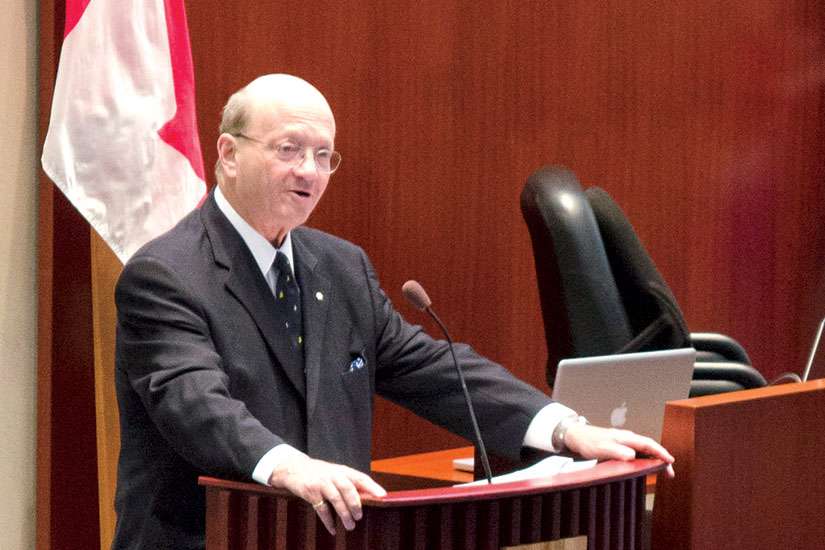After years of lobbying government from the inside, Segal stressed that the voice of faith leaders is needed to combat the scourge of child poverty.
Although faith communities may not have the authoritative power of politicians, Segal said their voice is not to be underestimated.
“The power to inspire, the power to show commitment, care and compassion, the power to convene may not be statutory, it may not be backed up by any law or enforcement, but in my view it is the greatest power in the world,” said Segal, who is now master of Toronto’s Massey College.
“That any one child goes to school hungry in this great country, this great province, this great city, is unthinkable and unacceptable,” he recently told about 150 leaders from various denominations at the Faith in the City symposium at Toronto City Hall. “You, the leaders of our faith and outreach communities, face the challenges every day in the outreach intakes of your churches. (You are) people who are not only concerned but committed to… action that will assist and alleviate the seemingly never ending problem of social inequality.”
It is estimated that one in four children in Toronto live in poverty, and Segal believes “it is actually getting worse.”
Segal, a Conservative who resigned his Senate seat last June, spent much of his final political years applying internal pressure on the government to address poverty. After being appointed to the Senate in 2005 he worked on the extensive In From the Margins report, tabled in 2009, which was a joint effort between Liberal and Conservative senators. The Harper government, however, rejected all 74 poverty reduction recommendations contained in the 300-page report.
That didn’t deter Segal, who spent more than four decades in the political realm. He continued his fight for the disadvantaged and published an essay promoting the benefits of a guaranteed annual income in Literary Review of Canada’s December 2012 issue.
Joe Abbey-Colborne, director of Faith in the City — a multi-faith symposium of Toronto’s faith communities — says Toronto’s faith groups are already making strides towards poverty reduction through action and advocacy.
“It has been the faith communities who were on the vanguard of this work, both in providing services directly to the people affected and in advocating for justice and changes to the system,” said Abbey-Colborne.
He pointed to the various services offered by faith groups, including the Out of the Cold program, seniors groups and ministries geared towards refugees and immigrants, as evidence of the attentiveness to the impoverished provided by the religious.
Although Segal praised faith groups for these types of programs, “they do not change the core dynamics separating the poor Toronto from the other Toronto.”
To make that kind of change, Segal and Abbey-Colborne agree faith groups need to work collaboratively and develop a collective voice on this issue.
“Faith communities could do so much more if they partnered with each other,” said Abbey-Colborne.
“We could do a better job if we can work together, not only of providing services but of advocating and working to change public policies and systems that aren’t working for people. (But) many faith communities need to be encouraged to find their voice.”
Jack Panozzo, Catholic Charities program manager for social justice and advocacy initiatives, says all faith groups are in that position.
“Faith communities have a lot of leverage to influence government,” said Panozzo. “Faith communities are not dismissed, they are taken seriously. People in politics know that faith communities represent large numbers of people who feel the same way.”
And that ability to bring political action and systemic change through the collective voice is why Segal is now calling on faith groups to curb the chronic problem of child poverty.
“This is not about right and left (conservative and liberal views), this is about humanity,” he said. “We need a fundamental fix here. Band-aids ... will do very little to make any difference.”


